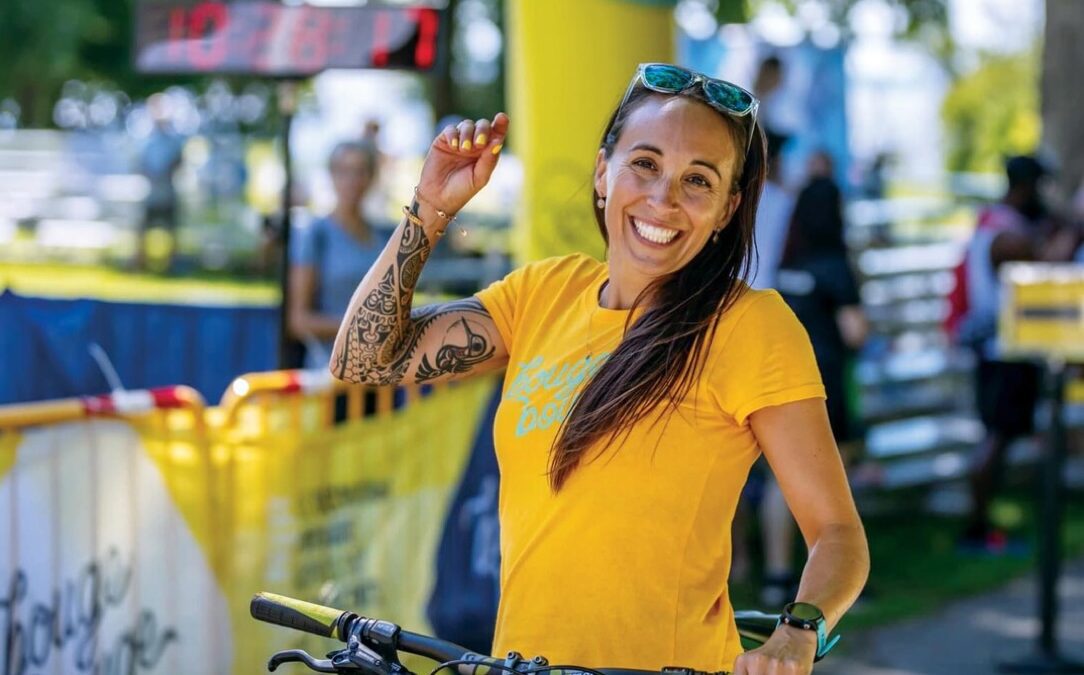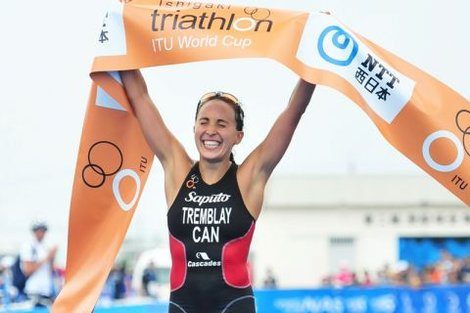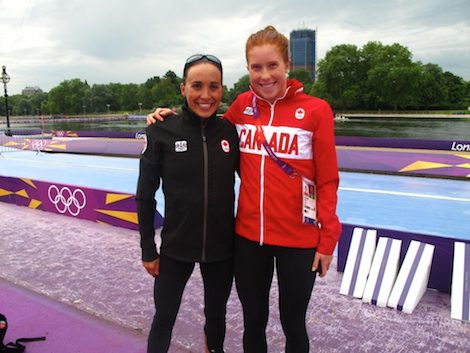A two-time Olympian explains why it’s OK to be a sprint triathlete
Canadian Olympic triathlete Kathy Tremblay explains why we need to encourage people to start with a sprint triathlon
 Photo by:
Sebastien Di Maulo
Photo by:
Sebastien Di Maulo
“For me, a sprint, it’s like falling in love.”
It’s the first thing Kathy Tremblay says to me when I ask her about her favourite triathlon distance.
“It’s like you’re 18 again,” she says. “Everybody wants to feel young, in love and sparkly. There’s no commitment. Anybody can do a sprint!”
Tremblay is sitting at home in L’Île-Perrot, Quebec, in a bright, airy room filled with plants and beanbag furniture, her longboard and a couple of kids’ scooters stacked in the corner behind her. She’s just back from her daily 5 km run, still a bit sweaty in her jogging tights and sports bra. At 42, the two-time Olympian triathlete could pass for 18, and there’s no doubt she would win her age group in a sprint triathlon right this minute if her ego would let her race one, which it won’t: “I know how fast I used to be,” she says, laughing.

The founder of a non-profit called BougeBouge, or “move move” in English, Tremblay’s focus now is on inspiring others – teenagers, retired folks, school kids and their families – to get outdoors, to take part in running races and other sports events in their communities and to incorporate physical activity into all aspects of their lives.
Which gets right back to why Kathy Tremblay loves the sprint triathlon.
“It’s not so long that you need to be fully committed,” she says. Regardless of your age or how jam-packed your life is, you can fit it in. Take biking, for example: “Go out with your kids. Bike with them to school. Out and back, let’s say that’s 12 km. That’s it: you did your training.”
We started this discussion with my observation that a lot of wannabe triathletes can’t muster much enthusiasm for a sprint. I can’t tell you how many people I’ve met with an Ironman on their bucket list who have never even considered racing a couple of seasons of shorter distance events, if only to get used to having people thrash around you in the open water or to test your skills in the transition zone.
How I learned to take off my digital watch before it became “like a handcuff”
“I have a lot of respect for Ironman,” says Tremblay, although she has no plan to do one. She says if revving up for a sprint is like falling in love, then training for a long-distance triathlon is like being one-half of a couple with a serious, long-term commitment.
“I’m totally not going into another relationship,” Tremblay says. “I already have mine, which is my family and my kids.”
As someone incapable of doing anything by half-measure, she knows the risks of pushing yourself to go harder, faster and farther without the time it takes to ramp up gradually, in a healthy way.
“You need to adapt your body for that long distance and for all that time sitting on your bike,” she says. “You need to put in all those hours.”
Finishing a sprint, she says, can give you just as big a sense of accomplishment, and it’s accessible to any jogger who knows how to ride a bike and how to swim.
Tremblay stops at the “how to swim” part and repeats it, for emphasis. It worries her that so few children and adults swim with confidence. Canada’s summer drowning statistics underscore why it’s so critical everyone gets the opportunity to learn. Her 10-year-old, Timothé, and Léo, seven, are already swimmers.
“I’m pretty sure my kids could do a sprint not too long from now,” she says.
For someone who is not a strong swimmer, the open water can be “very scary,” Tremblay says. “You start in a mass, and when someone touches you in the water, sometimes you take it personally.” But if the guy behind you grabs you, “it’s probably because he doesn’t know how to swim.”
We ALL belong there – The ‘World’s Okayest Triathlete’ goes to Kona
If that queasy swimmer describes you, Tremblay recommends taking lessons and making it a goal to work on your technique, endurance and comfort level in open water. For confident swimmers ready to try a tri, Tremblay says two swim workouts a week are enough to get you through a sprint triathlon, but she is a big fan of three.
“Those first two swims, it’s just to maintain,” she says. “When you train three times, that third time helps you to get to another level.”
Like so many of the greatest triathletes – Lionel Sanders excepted – Kathy Tremblay started out in her hometown of Gatineau, Que., as a competitive swimmer. She was tiny and skinny, but she had fast-twitch muscles and lots of energy to burn. At 12, she was not much more than 75 pounds, she says: “I looked like a stick.”
So when her dad counselled, “Kathy, if you do triathlon, you’ll have muscles,” she bought his advice hook, line and sinker.
“It was a big lie,” she laughs. “I never really had big muscles, but I fell in love with this sport.”

Tremblay came 31st in Beijing in 2008 and was on the World Cup podium three times in her career, including a gold in Ishigaki, Japan, in 2012, where she clinched a second Olympic berth for Canada. A cycling crash led to a DNF in London that summer, and she retired after the 2012 games.
If triathlon has been replaced as her first love by her kids and husband, her one-time coach David-James Taché, Kathy Tremblay’s other big love is sharing her drive, energy and motivation with a wider community, which is where BougeBouge comes in. There are now a dozen BougeBouge multisport festivals in western Quebec and eastern Ontario, including a fast and flat marathon in L’Île-Perrot in early May that’s a Boston qualifier, and plans are in the works for a Valentine’s weekend festival in Toronto next February.
The motivation to embrace life fully, Tremblay says, comes from being confident and competent and supported within your community. She found hers in short-course triathlon. For someone else, it will be yoga, or soccer, or pickleball – or whatever it is you love.
For more information on BougeBouge and the dates and times of festivals in 2024, go to BougeBouge.com.
Loreen Pindera is a freelance writer and avid triathlete from Montreal, Que.
